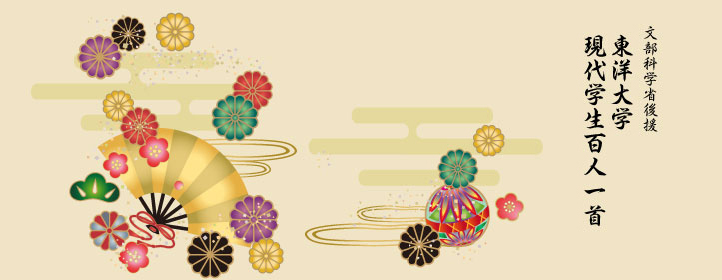What is Hyakunin Isshu?
In Japan, word play in a style similar to that of tanka began around the 7th century. Since then, the art of poetry composition developed among the country’s ruling class and at court. During Japan’s Middle Ages, from the Heian to Kamakura era (794-1333 CE), one hundred poems by noted authors were compiled into a collection called Hyakunin Isshu (literal translation: “one hundred persons, one poem each”). Hyakunin Isshu still exists and is popular in today’s Japan as a form of traditional culture, one well-known collection being widely used in a New Year’s card game.
Modeling this anthology on the Hyakunin Isshu, Toyo University openly solicits tanka poems from students and selects the best 100 entries that express their fresh sensibilities and trends of the times.
What is Gendai Gakusei Hyakunin Isshu?
Gendai Gakusei Hyakunin Isshu (One Hundred Poems of Modern Students) Contest began in 1987 as a Toyo University centennial commemorative event. In 2019, its 33rd will be held. The total number of tanka poems entered in the previous contests, expressing present-day students’ views of the world and their daily life, has reached over 1.44 million.
What is tanka?
Tanka is a fixed-form poem composed of 31 Japanese units of sound (similar to “mora”) in total that can be divided into phrases of 5-7-5-7-7 sounds to express one’s feelings and impressions in a daily situation. One unit of sound corresponds to one kana character.
For example, 「沖縄で 海にもぐって 魚とり あの海へびは おそろしかった」(Okinawa-de umi-ni mogutte sakana tori ano umihebi-wa osoroshikatta – In Okinawa, I dove into the sea and caught fish; that sea snake was scary) comprises phrases of 5 sounds (o-ki-na-wa-de), 7 sounds (u-mi-ni-mo-gu-t-te), 5 sounds (sa-ka-na-to-ri), 7 sounds (a-no-u-mi-he-bi-wa), and 7 sounds (o-so-ro-shi-ka-t-ta) . A good tanka poem makes a creative use of characteristics of the Japanese language and enables the reader to vividly imagine the scene depicted or sympathize with the author’s feelings expressed.
Entry Period
Friday, September 20 – Wednesday, October 16, 2019 (both dates inclusive)
How to apply
Write your poem and the required information in the attached application form, convert the file into a PDF, and send it to the address below.
E-mail address
mlkoho@toyo.jp (PR Section, General Affairs Dept., Toyo University)
Application guidelines, forms, may be accessed here:

